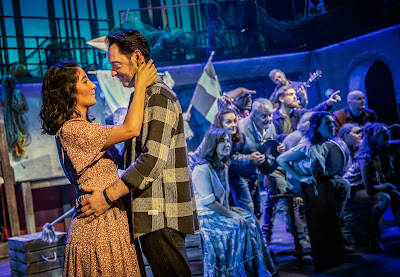Reviewed by James Karas
The energetic and only-one-of-its-kind-in-Canada Toronto Operetta Theatre is never far from one of the best operettas ever composed – Die Fledermaus. This year marks its 6th production of Johann Strauss’s masterpiece since the founding of the company is 1985.
The current offering is a reprise of previous productions directed by the inimitable Guillermo Silva-Marin and conducted by Derek Bate and it has many features that make it worthwhile seeing- if you can get a ticket. Most people know what Die Fledermaus is all about but a few facts may refresh your memory. We are in the house of the well-off Viennese businessman Gabriel Eisenstein (Keith Klassen). He has to spend a few nights in jail but he also wants to go to a grand costume party thrown by the wealthy Prince Orlofsky (Gregory Finney). His lovely wife Rosalinda (Kirsten Leblanc) wants to go to the party and so does their maid Adele (Andrea Nunez).
Eisenstein’s friend Falke (Colin MacKay) goes to the party but, as The Bat, he has a score to settle with Gabriel. Add Alfred (Scott Rumble), an Italian tenor in lust with Rosalinda who is taken to prison as if he were Gabriel and you have a fine mess to unravel.
Silva-Marin shamelessly tinkers with the plot for laughs. When Alfred recollects singing to Rosalinda wonderful love arias it was done in Mississauga. Throw in presidents who go to jail and mention Mara-a-Lago and you get the laughs. Strauss’s effervescent music does the rest.
There is some fine singing especially by Nunez as the maid. She has a lovely bell-like voice and fine stage presence. LeBlanc has a big, brilliant voice but its size works against her because she tends to overwhelm the other singers in her duets and trios. She needs to reduce her volume and let the other singers be heard.
Finney sings melodiously as Orlofsky and has a sense of humour. Silva-Marin steals the show in the final scene in the operetta which takes place in the jail. As Frosch the Jailer he holds the mistakenly imprisoned tenor, Alfred. The latter gives Frosch singing lessons with the primary advice being to hold a dime between his “cheeks” while singing. Silva-Marin still has a few high notes left in him and he can provoke much laughter.
Klassen as Gabriel was not at his best in the performance that I saw. His voice appeared small and he was out-sung by his colleagues. The rest of the cast is mostly competent with some variations in quality.
The chorus sang beautifully but when called upon to do a few steps of a waltz, which they did, by shifting their weight from one foot to the next. They should have been taught how to do a couple of one-two-three spins that looked as if they were waltzing.
Conductor Derek Bate has only nine musicians and slightly more choir singers but he brings energy to the effervescent music and beauty to the ensemble singing.
Silva-Marin and the TOT work with at least one hand tied behind their back. The Jane Mallett Theatre has little to recommend it except that it is there. It has no orchestra pit and the musicians are simply lined up in front of the stage. The sets are almost non-existent and the costumes are decent but nothing special.
It is all a matter of funding and unfortunately the only operetta company in the country survives by what it can get from donors and whatever grants come from the three levels of government. It is a sad situation. They deserve solid funding for more first-rate singers, designers, artistic staff and a bigger orchestra and chorus and more productions.
__________________________________
Die Fledermaus
by Johann Strauss is performed three times on December 28, 30 and 31 2022 at the Jane
Mallett, Theatre, St. Lawrence Centre for the Arts, 27 Front Street East,
Toronto, Ontario. www.torontooperetta.com













.jpg)


.jpg)



